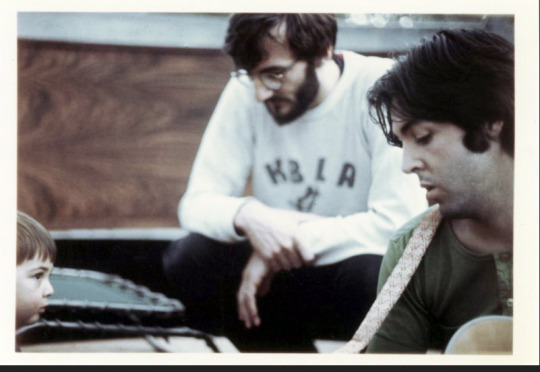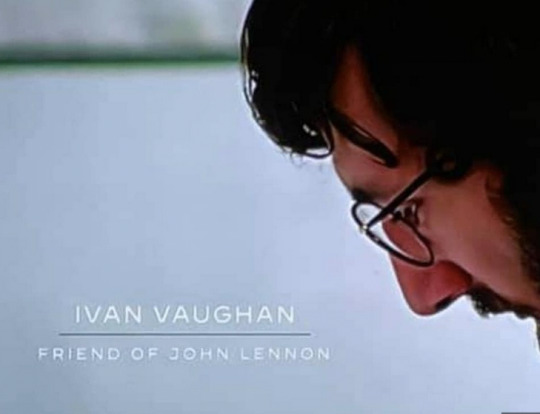#Interesting point about Paul's constancy and the 'simple values he held dear'
Explore tagged Tumblr posts
Text
Ivan Vaughan writes about John and Paul
This is just a relatively brief excerpt from Ivan Vaughan's book, which, for the most part, focuses on his life with Parkinson's disease. (From what I can tell so far, it's absolutely fascinating: far more than 'simply' a memoir, it's a reflection on illness, the mind-body connection, science, psychotropic drugs, patients' autonomy...and much more.)
But since this blog is climbing the drainpipe to the John & Paul business, and there's been some recent discussion of Mark Lewisohn's claim that John was such a bad boy Ivan's mother sent her son to a different grammar school to separate the two, I thought the following might be interesting.
And the ending of this chapter also gives some context to Paul's reaction to John's murder—another topic about which ML has interesting opinions.
This isn't to pile on ML, but more...as words from someone who was there.
(CC: @mythserene, @anotherkindofmindpod) I met John when I was three or four years old. One wet morning there was a knock at the front door. My mother opened it, and looking down, found a boy a bit older than me, smiling, but preoccupied with the effort of remembering what he had been rehearsed to say.
‘I believe a little boy lives here. I wondered if you might like to come out and play.’ He stood there in the porch, rain pouring down behind him, with a pair of slippers under his arm.
‘Come on in. What’s your name? You live round the corner don’t you?’
Next day I went around to the house where he lived with his aunt and uncle. We played with Dinky cars. I was surprised by his generosity and willingness to share his toys; he was happy even for me to take some of them home. When his Uncle George came home with some sweets John readily shared them. There was an immediate bond between us. He was older, read books, and his great intelligence and experience were apparent. I accepted his leadership but I was determined to preserve my independence. From the warm security of Aunt Mimi’s control, John accepted me into his life.
John was a member of his local library and immersed himself in books so that by the age of five he was already a fluent reader. I was still in the infant school when he started at Dovedale Road Primary School, but we played together after school and weekends. There were numerous parks, a golf course, and fields full of tangled growth and trees — just right for playing cowboys and Indians. In one barren area with large lumps of hard earth we played football and cricket. We spent hours digging all tracks to race our Dinky cars. Our most exciting game, though, was ‘fires’. We would go to a large area of waste ground and simply set fire to the straw and watch the place. I have never understood why nobody stopped us.
John’s gang comprised, besides himself, Pete Shotton, Nigel Wally and me. I was the youngest and was constantly having to prove my worth. I feel privileged to be John’s friend since he was nearly two years older. He protected me against Timmy Tarbuck and his gang on the rare occasions when I made the mistake of confronting one of them.
John and I went to different grammar schools, but I used to hear about the chaos and riots that seem to be a daily feature of his schooling. I’d rather lost touch with him when I went to university, and did not see him again until sometime after I was married. Then one day, as I was playing with my little boy Jus on the steps of our house in London, white Rolls Royce turned into the road. John jumped out followed by a woman I have not met before.
‘Hello, Ivy! This is Yoko.’ (…)
My attachment to both John and Paul ran deep and occasionally I would go to great lengths in order to see them at a moment’s notice. Maybe Paul saw our continuing friendship as a way of maintaining simple values he held dear. Jan liked Paul, though she did not see much of John. She was not the least bit mesmerized by their fame. She enjoyed eating at expensive restaurants in sampling London’s nightlife, into which Paul took us from time to time. But, should the effort to come to great, she was willing to let the relationship fade.
A month after telephoning John in New York [with the news of the Parkinson’s diagnosis; their first conversation in years], a heavy parcel was delivered. It was not until I was reading the titles of the books it contained that I realized they had been sent by John and Yoko. There was one by Arthur Janov, author of the Primal Scream, and one entitled Mind Magic. How to Get Well had on the fly-leaf a message from John that read ‘to start looking’, and The Snow Leopard had a note saying ‘to relax’. This last book gave me the greatest pleasure and I frequently re-read passages from it. Its author, Peter Matthiesen, lost his son through illness and journeyed in Nepal and in Inner Dolpo on a completely pointless journey to catch sight of a snow leopard. The peace he found travels across to the reader from each page.
John’s accompanying letter urged me, in punning language, to keep my spirits high and strongly suggested that it was up to me whether I sank or swam. I must not lose faith in myself.
Ten weeks later he was shot dead. Paul and I did not contact each other about it; in fact, we never brought it up in conversation. I hardly reacted outwardly at all. The day after John’s death, however, a colleague said that he supposed I was very upset at what it happened. I heard myself say: ‘I don’t know what I feel. I don’t know that I feel much at all’. As soon as he had gone, I instinctively made my way to a room where I knew I could be alone, and I wept profusely.
-- from Ivan-Living with Parkinson's Disease by Ivan Vaughan. 1986.


#John's warmth and sweetness come through in Ivan's memories despite the sporadic nature of their later friendship#Interesting point about Paul's constancy and the 'simple values he held dear'#The ending kills me#That's the men they were#despite the Summer of Love and stuff...#Ivan Vaughan#paul mccartney#John Lennon#(LEADER)#Tune in#fine tuning
144 notes
·
View notes